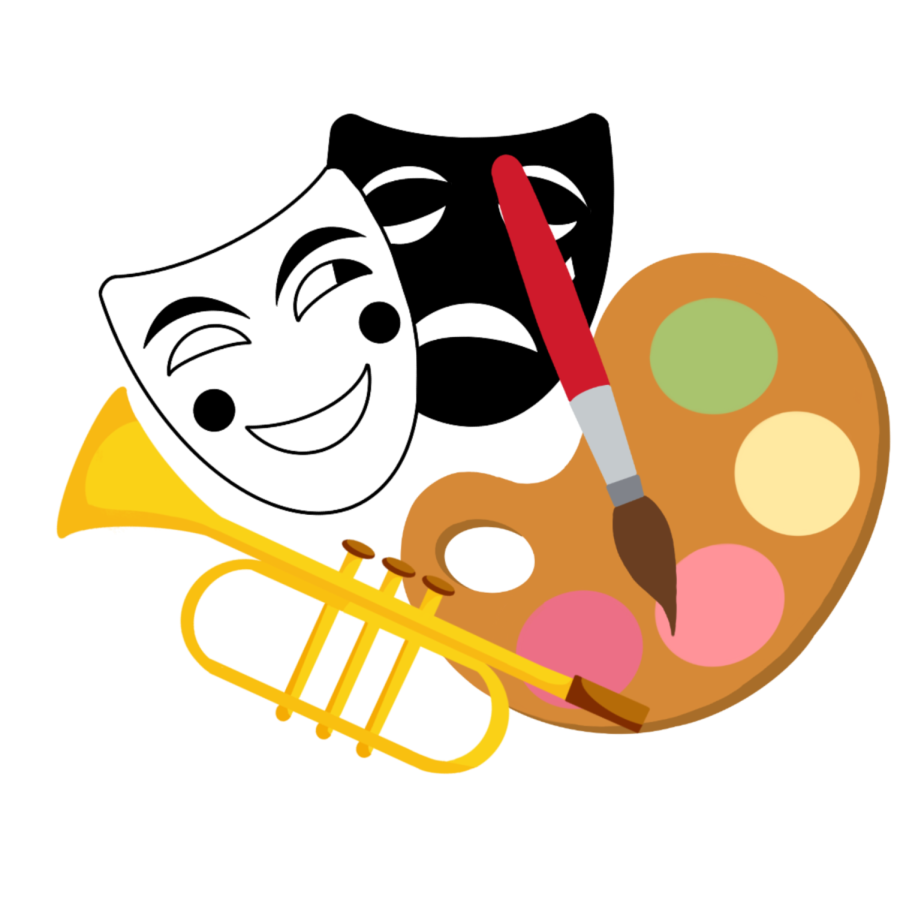Editorial: Supporting school elective programs
Graphic illustration by Lilly Wu
Theater masks, painting materials and a trumpet are symbols of creative art electives offered at Lynbrook that have been affected by declining enrollment.
March 10, 2023
While Lynbrook hosts many opportunities for students to build and showcase talents in creative elective courses, many engage in outside organizations rather than their in-school counterparts. Although larger class sizes and packed academic schedules discourage students from taking creative elective courses, the inspiring environment and abundant resources benefit students who seek to expand their preexisting skills or explore creative pathways on campus.
A combination of declining enrollment at Lynbrook for the past few years and increasing variety of options outside of school have reduced the number of students in elective programs. Still, FUHSD schools offer a robust variety of courses, from cooking to art.
“There’s a minority of students who are taking AP Art outside for enrichment and not for school credit,” 2D art teacher Matthew Reynolds said. “If that trend were to continue, it would be a problem.”
Current declining enrollment could result in some higher-level creative electives being lost, forcing students of all skill levels to be confined to one or two courses. To attract new students, Lynbrook’s art department has introduced two new courses, expanding from only 2D art and 3D art to multi-level photography to ceramics programs. Current offerings at multiple levels in most courses means that students can show progression and build their interest in each subject area. Living skills electives, for example, offer two sections of Introduction to Culinary Arts and one section of Culinary Food Science. Other specialized classes, such as different levels of Art, are combined into one period where students work with greater independence.
“Everyone in AP Art has different styles, so I value the individual feedback I get from Mr. Reynolds,” AP Art student Meghna Rai said.
Similarly, to cater classes toward varied student interests and skill levels, Lynbrook orchestras, bands and choirs continue to offer different levels and of smaller class sizes. However, these groups often combine to cover a wider range of repertoire for performances.
STEM electives such as Computer Science, Accounting and Business have increased in popularity and are another factor in declining enrollment in other electives. Within the district, two schools have already lost their culinary programs due to declining enrollment. While such courses offer a unique opportunity for students to learn valuable life skills, some choose instead to dabble in these subjects through alternate venues, like clubs.
“I always find it interesting to see students that are interested in culinary enough to look at it as a club, but then not as a course,” culinary teacher Megan Miller said.
In addition to focusing on one’s improvement and skills as an artist or musician, school programs encourage students to actively contribute to their community with their artistic skills. Ceramic students’ pieces are showcased in the office and library, and Lynbrook’s artists get their art displayed in front office and district offices. School choirs, bands and orchestras provide music for events like graduation, ribbon cutting events, singing the alma mater during rallies and national anthem for sports events.
“As musicians, this is our service to the community,” choir teacher Crystal Isola said. “ It fosters school spirit and brings us together. To be unable to celebrate the important rites of passage, accomplishments, joys and sorrows with our own school ensembles would not be good for the community.”
In addition, students participating in school arts and music classes can participate in school-sponsored activities such as all-state orchestras and all-national choirs as well as build portfolios for college and beyond.
Training in creative electives can also help students develop practical skills that students do not build from regular academic classes.
“At back-to-school night, I have had many parents involved in the tech industry comment that creative skills like experimentation and creating iterations of possible ideas are skills that are required in the tech industry,” Reynolds said.
The arts encourage students to express themselves and build confidence. The drama and advanced drama courses are one such pathway students can explore unique personal expression, as the collaborative environment encourages students to communicate comfortably with their peers.
“In drama, you learn to present yourself in an artistic manner,” drama teacher Larry Wenner said. “Getting up in front of an audience is nerve-racking for some people, and to be able to do that will be very handy later on, like in job interviews and the corporate world.”
In addition to being a relief from traditional academic classes during the school day, the uplifting and collaborative environment of creative electives allows students to explore potential interests, build lifelong skills, discover a hobby and share their passion with peers in Lynbrook’s creative electives.
“You really get to form close bonds with the people in your elective program,” senior Eunseo Oh said. “It’s also meaningful to connect with people who share your passion within your school.”
*the Epic voted 38 -1 in favor of this stance with 1 abstaining.*


































































